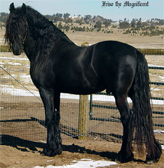Vaccines
After the Laminitis Conference in 2007, I spoke to several owners and veterinarians about Insulin Resistance and vaccine precautions needed for these horses. The exact mechanism is unknown, but these horses seem to be more prone to adverse vaccine reactions than the general population. I advise, and I will bet your doctor would agree, that splitting up vaccines into 3 sessions seems to avoid the problem and give Banamine at each session the morning prior to vaccines (so it is on board prior to injections). Get a tube of Banamine Paste – Give 1/3rd of a tube = 500 mg per 1000 pounds of horse. ![]() Banamine is NOT like a dewormer – you do not give the entire tube to any horse.
Banamine is NOT like a dewormer – you do not give the entire tube to any horse.
1. If your horse is the one in the barn that gets big hives, large swellings, or colic/sick year after year on vaccines, get tested for Insulin Resistance.

2. How to Give:
A. Avoid combo vaccines with 4 or 5 antigens in one shot. These seem to provoke more problems. Try for just Flu/Rhino, or just Enceph/Tet, or just Botulism, or just West Nile Virus.
B. NO Vaccines in the neck – all in Gluteal. It is a bigger muscle. They move muscle a lot in walking, so vaccines are spreading out and not concentrated as much in one spot.
C. Example:
Week 1 – Flu/Rhino Shot and separate West Nile Shot. One in Right Gluteal, one in Left Gluteal. Banamine given prior.
Week 2 – WEE/EEE/Tetanus Shot and separate Botulism Shot. One in Right Gluteal, one in Left Gluteal. Banamine given prior.
Week 3 – Rabies Shot and separate PHF Shot. One in Right Gluteal, one in Left Gluteal. Banamine given prior.
3. Broodmares that are Equine Insulin Resistant before pregnancy. (![]() Go to our Pregnant Mare Section for in-depth information on HEIRO and broodmares.)
Go to our Pregnant Mare Section for in-depth information on HEIRO and broodmares.)
 A. All pregnant mares will get a series of vaccines throughout pregnancy, up to month 9.
A. All pregnant mares will get a series of vaccines throughout pregnancy, up to month 9.
B. All pregnant mares become Insulin Resistant by the end of pregnancy. It is a normal event. The problem is in mares already Insulin Resistant before breeding. They go from high Insulin to super high Insulin.
C. Each time vaccinated, give these mares (1000 pound) Banamine either oral or in the vein – 500 mg – that is 1/3 of the Banamine Paste Tube or 10cc in the vein. Do doses at least 2 hours prior to vaccines, so medications are in place to help decrease inflammatory reactions.
4. Vaccine doses may be the reason for Insulin Resistant Horse reactions in vaccines.
A. A 200 pound mini gets the exact same dosing of vaccines as a 1500 pound draft horse. For example, both get 2cc of Rabies Vaccine.
B. In mini’s, small/medium ponies, Banamine really helps them.
C. Do NOT cut vaccine doses or try to dose by the pound. Follow FULL Vaccine label requirements.
5. Insulin Resistance in horses does not negatively affect the immune response to vaccines – Good!
In a 2016 study at the University of Kentucky, they found the humoral response to the influenza vaccine was similar to controls, so the protective ability of the vaccines is in place. This is great news because in other species, Insulin Resistance can cause lowered protection post vaccine. ![]() Click here to read the study.
Click here to read the study.
![]() Click here to see 26 ways HEIRO is the Best Choice and why the winner over other products.
Click here to see 26 ways HEIRO is the Best Choice and why the winner over other products.
Proper diet and exercise is essential for horse health. This product is a supplement to help maintain horse health. This product is not intended to diagnose, treat, cure, or prevent disease.







; ?>/wp-content/themes/twentyten/img/NMImacLogo_150.jpg)






